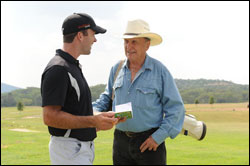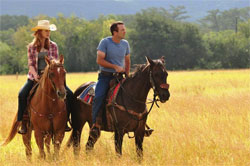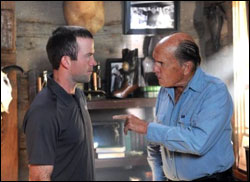A lot of elements are all too familiar in Seven Days in Utopia, a redemption story that indeed takes place over a week’s time in the small town of Utopia, Texas. The film involves a golfer who tries to get his swing back with wise counsel from a mentor, played by the great Robert Duvall. But even he can’t save this triple bogey of a movie.
Based on David L. Cook’s book Golf’s Sacred Journey: Seven Days at the Links of Utopia, the story is similar to Pixar’s Cars. A hotshot sports star accidentally crashes in a small town, and after spending some time with the locals, he learns some important life lessons to become a better car/man. If only Seven Days, a sappy mess of tedious clichés, were crafted as well as Cars.
Duvall plays Johnny Crawford, a grizzled but kindly local rancher who helps golfer Luke Chisolm (Lucas Black), who’s a wreck (so’s his car) from daddy-caddy issues. Luke’s dad puts too much pressure on his son, which leads to an on-course meltdown on national television.

Thus Luke finds himself in the conveniently named Utopia, where it just so happens that Johnny is a retired golf pro who also battled his own personal demons. (Yet another Cars comparison: hotshot mentored by a wise local who happens to be a retired legend.) He promises to improve Luke’s game if he’ll just stay in town for the week. At the town festival that evening, Luke wonders if he should take Johnny up on his offer—and the film immediately responds with fireworks in answer to his question.
And so it predictably goes. Luke learns that there’s more to golf than winning, thanks to Johnny’s series of unorthodox exercises a la Karate Kid—writing, painting, fly-fishing, metal washer tossing, and flying. Luke also befriends Sarah (Deborah Ann Woll), the local town beauty who wants to become a horse whisperer. And there’s a villain, Jake (Brian Geraghty), a jealous cowboy who also likes Sarah and has it out for Luke from day one. Oscar winner Melissa Leo has a bit role as Sarah’s mother.
 ??????
??????The movie gushes with virtues and even points to Christianity for peace. But despite striving for authenticity—including a role by touring pro KJ Choi—the story fails to deliver genuine characters or plausible storytelling. The sloppy screenplay—by Cook, the director, and two other writers—wants us to be inspired while lazily rehashing clichés seen many times before in far better films.
It’s the sort of movie where characters change personalities on a dime. Why does Jake suddenly take a liking to Luke? It’s never explained. Why does Luke eventually reconcile with his overbearing father? We don’t know. Supposedly a week apart has changed Dad from a lifetime of pushing and prodding to unconditional love and acceptance.
Moreover, Seven Days sluggishly wraps up with 15 minutes of golf tournament action that plays out far too predictably. There isn’t even a proper ending, the film’s only surprising touch, intending to drive home its core message that golf—and, presumably, life—is a game that is played and lived, but not always won. (The movie points viewers to a website, presumably for the ending and an introduction to Christ.)
And despite being heavily pitched to the Christian market, Seven Days offers pretty thin theology. There are good messages, and it’s great that the movie points viewers to the Bible. But the concepts never go deeper than “It’s all part of God’s plan” or “God works in mysterious ways.”

Mostly, the movie breaks the cardinal rule of “show, don’t tell.” It would have done just as well with Johnny simply reading generic platitudes to Luke out of Life’s Little Instruction Book, Chicken Soup for the Golfer’s Soul, or other such pabulum from the Hallmark store. It’s not that Seven Days lacks meaning, but that such a hackneyed and clumsy movie fails to provide enough reasons to care. Before it can call itself an inspirational movie, it has to inspire. And this one simply does not.
Talk About It
Discussion starters- Johnny preaches the motto of SFT: See, feel, trust. At one point he tells Luke, “Don’t think. See, feel, trust.” Is that how faith works? Is there a role for thinking in everyday life, or are we simply meant to SFT?
- Characters refer to everything being “all part of God’s plan.” Is that accurate? Do you believe sin and death are part of God’s plan? Discuss. (See Genesis 50:20 and Romans 8:28.)
- Luke is told that there’s more to life than winning, as well as more to life than living right. How are these two messages intertwined? Why is golf an effective metaphor for life? What sets it apart from other sports in explaining life lessons?
- Johnny instructs Luke to write his own epitaph: “What do you want people to say about you when you’re gone?” What would you write for yourself? Would it include personal success? Your family? Your faith? What’s most important to you?
The Family Corner
For parents to considerSeven Days in Utopia is rated G, though it does have light profanity (“hell”) in a couple scenes. Also, Luke suffers a head injury from his auto accident that leaves his forehead a little bloody. The film is otherwise very wholesome.
Photos © Warner Bros. Pictures
Copyright © 2011 Christianity Today. Click for reprint information.











